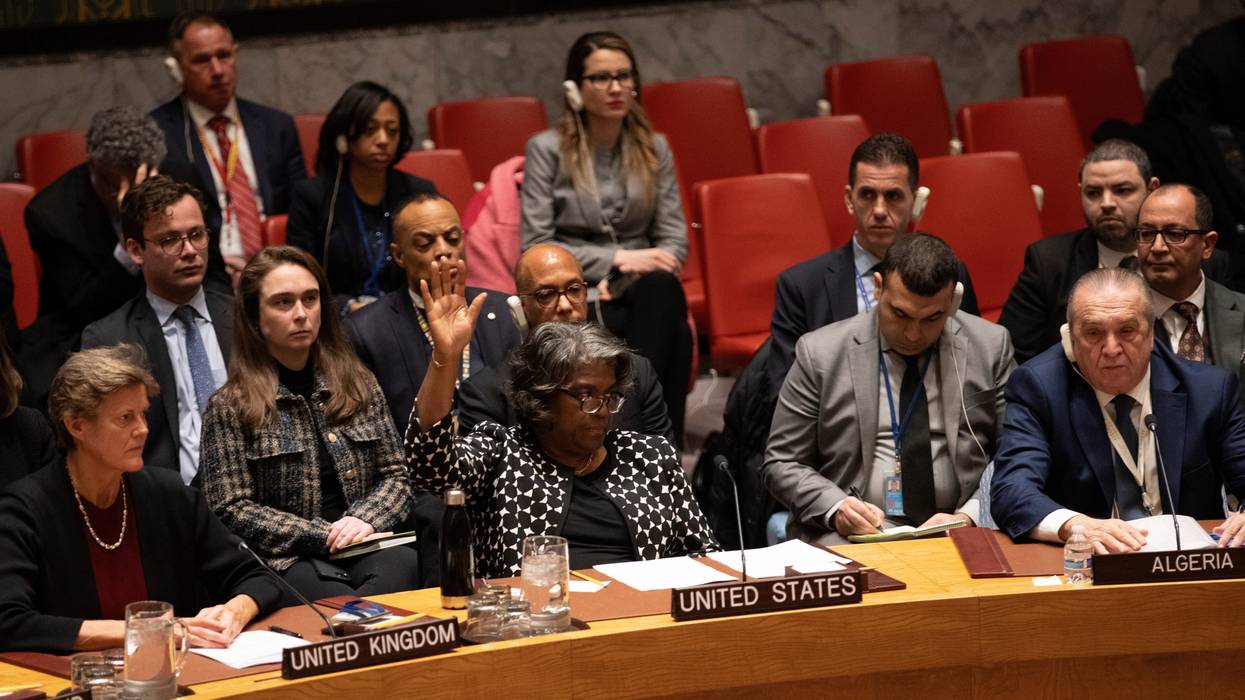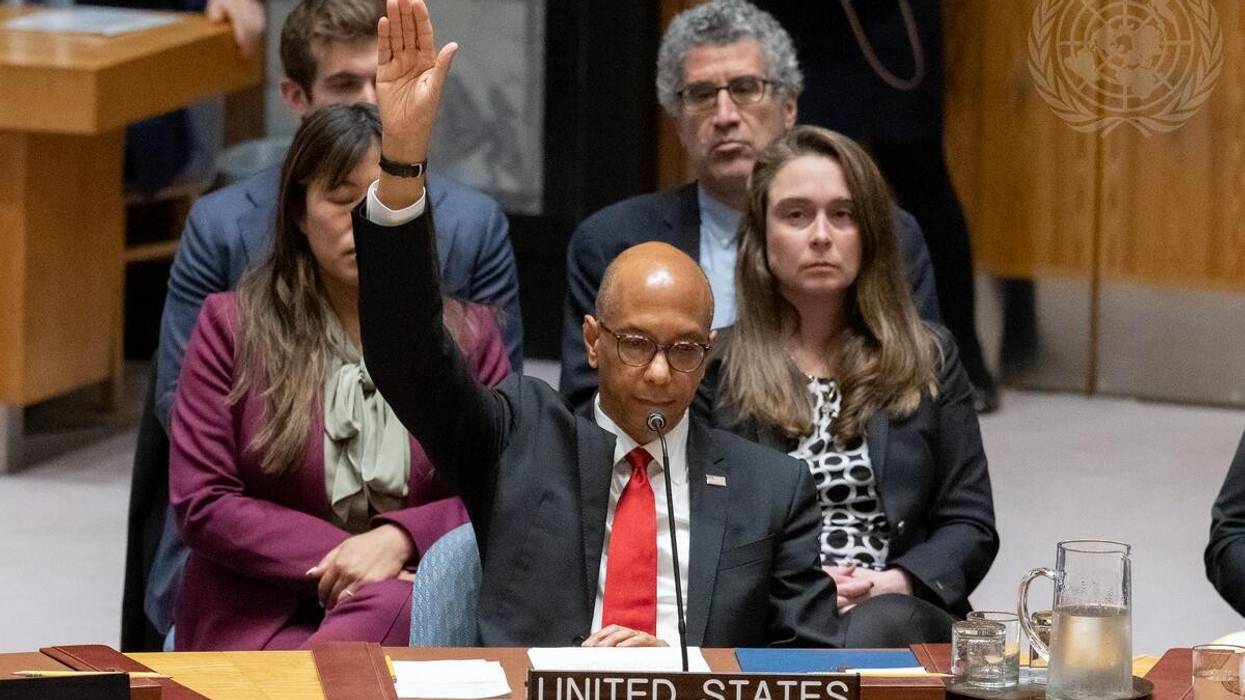Report Shows How Five Global Powers on UN Security Council Are 'Vetoing Humanity'
"The UNSC is failing people living in conflict, with Russia and the United States particularly responsible for abusing their veto power," said Oxfam.
As the number of people in need of humanitarian assistance worldwide has skyrocketed by 150% over the last decade, five powerful countries on the United Nations Security Council have had hundreds of opportunities to vote for progress in some of the world's most protracted conflicts—but in dozens of cases, countries including the United States and Russia have instead vetoed peace and security resolutions.
In its report, Vetoing Humanity, Oxfam International pointed Thursday to numerous vetoes made by the five permanent members of the U.N. Security Council (UNSC), or the P5, which the humanitarian group said have placed their own economic and political interests ahead of the council's mission.
The group examined 23 of the world's longest violent conflicts, including those in the occupied Palestinian territories, Syria, Ukraine, and Yemen, which have collectively been the subjects of 454 resolutions passed by the UNSC since 2014.
But 30 resolutions have been vetoed by one of more of the P5 countries, including eight out of 12 regarding Palestine and Israel, 15 out of 53 on Syria, and 4 out of 7 on Ukraine.
"The UNSC is failing people living in conflict, with Russia and the United States particularly responsible for abusing their veto power," said Oxfam, noting that the two countries have together cast 75% of the 88 vetoes at the UNSC since 1989, with China casting the rest.
The other two permanent members, the United Kingdom and France, have not used their veto power since 1989, but they have still joined the other powerful countries in undermining global peace and security, said Oxfam.
In addition to veto power, the P5 has "pen-holding" privileges at the UNSC, allowing them to lead negotiations and decide how resolutions are drafted or whether they are ignored.
"The erratic and self-interested behavior of UNSC members has contributed to an explosion of humanitarian needs that is now outpacing humanitarian organizations' ability to respond. This demands a fundamental change of our international security architecture at the very top."
The P5 members have "deliberately cherry-picked which conflicts to address in the Council," reads the report. "Over the last decade, over 95% of the resolutions that the UNSC passed relate to just half of the protracted crises, leaving the other half mostly neglected."
France, the U.K., and the U.S. have held the pen on two-thirds of protracted crises over the last decade, allowing them to direct negotiations. For example, the U.K. has pen-holding privileges in talks on Yemen, "where it has interests due to historical colonial links and the strategic desire to maintain maritime routes."
The United States' use of its veto power at the UNSC has come under particular scrutiny in the past year, as it has vetoed three resolutions calling for a cease-fire in Gaza since Israel began bombarding the enclave and blocking humanitarian aid to its 2.3 million people, pushing the population toward famine. It has also vetoed proposals to grant U.N. membership to Palestine, despite the U.N. General Assembly (UNGA) voting in favor, 138-9.
"While the UNGA has passed at least 77 resolutions over the last decade supporting Palestinian self-determination and human rights and an end to Israel's illegal occupation, the U.S. has used its veto power six times to block resolutions perceived as unfavorable to its ally Israel," said Oxfam. "The U.S. vetoes have created a permissive environment for Israel to expand illegal settlements in the Palestinian territory with impunity."
P5 vetoes have "more often than not," said Oxfam executive director Amitabh Behar, "contradicted the will of the U.N. General Assembly, in which all states are represented."
The report details other vetoes by the P5, including a 2023 veto by Russia of a nine-month extension of cross-border assistance to northern Syria‚ a decision that left 4.1 million people with little or no access to food, water, or medicine. Russia has also vetoed several resolutions on the country's invasion of Ukraine in 2022, despite the fact that the U.N. Charter states that "a party to a dispute shall abstain from voting."
"China, France, Russia, the U.K., and the U.S. took responsibility for global security at the UNSC in what is now a bygone colonial age," said Behar. "The contradictions of their acting as judge and jury of their own military alliances, interests, and adventures are incompatible with a world seeking peace and justice for all."
While the P5 ostensibly helped form the UNSC with the aim of promoting and maintaining global peace and security, the report notes that "they are providing more resources in the form of military aid than they are in humanitarian assistance," with its assistance being used not just defensively by recipients but also helping "to fuel and perpetuate the conflicts that the UNSC is failing to prevent and resolve."
"In 2019, the USA provided three times as much security assistance as humanitarian aid: $18.8 billion versus $6 billion," reads the report. "China pledged $20 million a year in military aid grants to Africa over 2015–17, whereas its worldwide humanitarian assistance in 2016 totaled less than $21 million."
"Not only have the P5 governments repeatedly failed to act to avert conflict, many have profited from wars by directly selling weapons to warring parties despite violations of international humanitarian law and the human suffering resulting from these wars," the report continues.
Behar said that "the erratic and self-interested behavior of UNSC members has contributed to an explosion of humanitarian needs that is now outpacing humanitarian organizations' ability to respond. This demands a fundamental change of our international security architecture at the very top."
The report comes as the U.N. prepares for the Summit of the Future, scheduled to kick off next week with the aim of envisioning "a revitalized U.N."
Oxfam made several recommendations to end the P5's ability to undermine the mission of UNSC, calling on member states to:
- Abolish the veto and take the preliminary step of requiring the P5 to refrain from vetoing resolutions related to war crimes, genocide, and crimes against humanity;
- Increase UNSC membership to include under-represented and unrepresented regions and countries;
- Reform the tradition of pen-holding;
- Make humanitarian funding mandatory for UNSC members; and
- Require that members refrain from transferring weapons to countries when there is a high risk that they will be used in violations of international humanitarian law.
"We need a new vision for a U.N. system that meets its original ambitions and made fit for purpose for today's reality," Behar said. "A Council that works for the global majority, not a powerful few."


